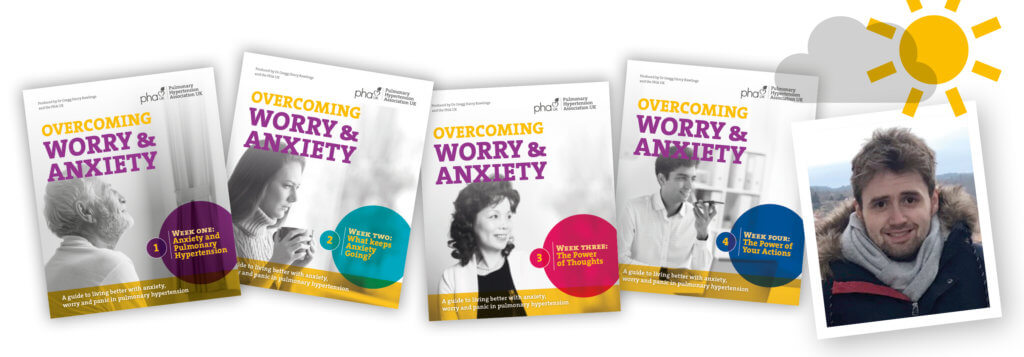
Up to 50% of people with pulmonary hypertension experience anxiety that affects everyday life, but we know it’s not always easy to get the help you need.
That’s why, in collaboration with leading UK researchers, we helped develop and test the world’s first self-help programme aimed specifically at those with PH.
The four-week programme, consisting of a series of workbooks based on Cognitive Behavioural Therapy (CBT), was the brainchild of trainee psychologist Dr Gregg Rawlings.
He was supported by Professor Andrew Thompson of Cardiff University, and Professor Nigel Beail of the University of Sheffield, and the aim was to develop tools that patients can access straight away and use in the comfort of their own home.
About the self-help programme (known as the ‘intervention’)
The intervention consists of four workbooks, each focused on different topics to give people the skills and insight to better manage their anxiety. The series, titled Overcoming Worry and Anxiety, is designed to be completed over a period of four weeks.
The content is based on Cognitive Behavioural Therapy (CBT), which helps people to change their unhelpful thoughts and behaviours and develop better ways of coping. CBT is proven to reduce anxiety in many people, including others with long-term health conditions.
How the study worked
The aim of the study was to test how effective the intervention is in helping people with PH manage their anxiety.
138 people with PH were recruited to the study from the UK, Canada, America, India and the Netherlands, and divided into two different groups. One group was asked to complete the self-help programme, whilst the other did not. Both groups answered questions about their anxiety symptoms at the same points.
Data was collected over an eight-month period between August 2020 and April 2021.
The results
What happens next?
Although further research is needed, it’s clear that we now have a valuable way of helping people with PH manage their anxiety, and we are keen to help as many people benefit from it as possible.
To enable further evidence of the intervention to be gathered, we are working on the next stage of the study – which will include making the programme available to all PHA UK members for free.
If you would like to be among the first to hear when you can access the programme, please email office@phauk.org with ‘Overcoming Worry and Anxiety’ in the subject line.
A word from Dr Gregg Rawlings, leader of the study
“There can be numerous barriers to getting support for anxiety in PH. This could be because of long waiting lists or services not being available, or because people feel uncomfortable talking about their difficulties, or worried that their PH won’t be understood.
For these reasons, we wanted to develop an intervention that people can access immediately and complete in the comfort of their own home.
While more research is needed and it is still too early to say this intervention is effective for anxiety in people with PH, the results are very promising.
It is great that the findings are consistent with what we expected and that participants experienced a number of benefits from taking part.
We developed the intervention with the PHA UK and other experts in PH, experts in CBT, and people living with PH and their caregivers. We took this step to make sure that the information in the programme, and strategies that participants learned, were specifically relevant to the challenges that people with PH experience. It is encouraging that 90% of participants valued that the intervention was focused on PH.
When developing the intervention, I learned a great deal about PH from conversations with healthcare professionals, and reading books, research papers and information online about the condition. However, it has been invaluable to listen to the first-hand accounts of people living with PH and the people who support them.
Last year, supported by the PHA UK, I reviewed the personal experiences of over 1900 adults living with PH from around the world. Among the experiences that struck me was the huge disruption that developing PH had caused people in their lives.
With this came great uncertainty, change and loss, which naturally many people found difficult. Closely related to this however was the strength and courage that was reflected in how people spoke about coping with the impact of PH. This ranged from the ongoing management of everyday activities that we often take for granted, to major life-changing decisions.
In the same way that people with PH often need to take additional measures to care for their physical health, they may also need to take more care of their mental health.
This is particularly because they are at a greater risk of experiencing psychological and emotional difficulties related to living with a long-term health condition.
I would like to take this opportunity to thank the PHA UK. Their expertise, wisdom and insight has been vital in making this project possible and successful.
I also wish to thank you, as members of the PHA UK, including those who took part in the study. Thank you for your time and allowing us to learn from your experiences with the aim of improving the support that is available.”